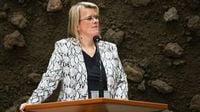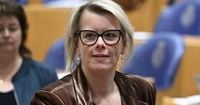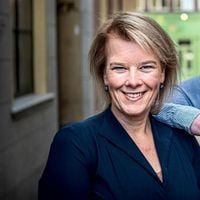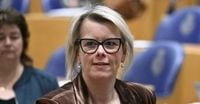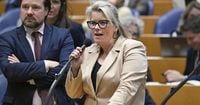Roelien Kamminga, a member of the VVD party, has been appointed as the new mayor of Groningen, marking a significant milestone in the city's political landscape. The announcement was made during an extraordinary council meeting at the Groningen city hall on April 7, 2025. This appointment comes as Kamminga replaces acting mayor Mirjam van 't Veld, who stepped in after Koen Schuiling resigned from the position.
Kamminga, 46, currently serves as a member of the Tweede Kamer, the Dutch House of Representatives, where she focuses on European affairs and kingdom relations. "We wanted the best mayor for Groningen, the best mayor of the Netherlands, who fights like a lion for Groningen. Champions League because Groningers deserve that," stated Jeffry van Hoorn, chairman of the selection committee, during the announcement. He expressed confidence in Kamminga's ability to lead the city effectively.
Born in Groningen and residing in the village of Zuidbroek, Kamminga has a background rich in public service. She studied International Relations at the University of Groningen and has held various positions within the Dutch government, including as program director at the Ministry of the Interior, where she worked on issues related to gas extraction in Groningen.
In her first statement following the announcement, Kamminga expressed her excitement and gratitude, saying, "I am very happy and honored with this nomination. This is a once-in-a-lifetime opportunity, especially for someone born and raised in the province of Groningen. I look forward to my new role and getting to know this wonderful city and its residents."
Kamminga's appointment is particularly noteworthy as it marks the first time a woman has been nominated as mayor of Groningen. The position has historically been held by male predecessors, including Jacques Wallage and Peter Rehwinkel. In the past, there had been hints at a desire for a younger female successor to Peter den Oudsten, but the eventual choice fell on the then 60-year-old Koen Schuiling.
Schuiling's resignation last year was abrupt. He cited a lack of energy for the role, which he attributed to various pressures, including the ongoing issues related to gas extraction and the asylum seeker registration center in Ter Apel. However, it later emerged that he was forced to resign by Minister of the Interior Judith Uitermark after receiving a fine for indecent exposure, specifically for allegedly masturbating while driving. Schuiling has since contested this ruling, claiming it was a "painful misunderstanding."
In the interim, Mirjam van 't Veld has been serving as the acting mayor since Schuiling's departure. Kamminga will officially take over once her appointment is confirmed by a Royal Decree, which is expected to occur by the end of June 2025.
As Kamminga prepares to step into her new role, her extensive experience in government is seen as a strong asset. Van Hoorn praised her for her "wealth of experience in multiple layers of government" and emphasized her deep connection to the region. Kamminga's commitment to Groningen is expected to resonate well with the community, especially given her history of advocating for local issues.
The political climate in Groningen has been tumultuous, especially in light of Schuiling's controversial exit. The city has faced challenges related to gas extraction, which has sparked ongoing debates about safety and environmental concerns. Kamminga’s previous work in addressing these issues positions her uniquely to navigate the complexities that lie ahead.
With her background in international relations and public service, Kamminga is poised to bring a fresh perspective to the mayoral office. Her leadership style, characterized by a strong commitment to community engagement and transparency, is likely to foster a more inclusive atmosphere in local governance.
As the citizens of Groningen await her official installation, there is a palpable sense of anticipation for what Kamminga will bring to the role. Her appointment has the potential to not only reshape the local political landscape but also to inspire a new generation of leaders in the region.
As Kamminga embarks on this new chapter, her journey will undoubtedly be closely watched by both supporters and critics alike. The challenges she faces are significant, but her determination and passion for Groningen may very well set the stage for a transformative era in the city’s history.

